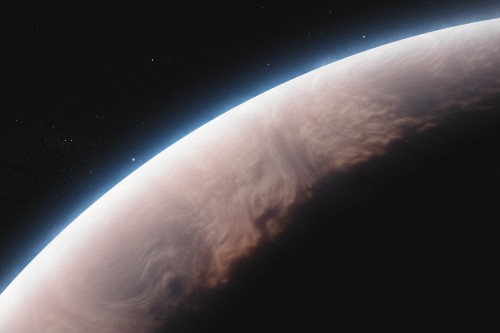Dr Hannah Wakeford, Associate Professor in Astrophysics at the University of Bristol, was chosen from more than 350 nominations to receive a Philip Leverhulme Prize, amongst 30 other outstanding researchers, announced today.
Her pioneering research has already demonstrated that the composition of clouds in exoplanet atmospheres can be measured. The role of clouds in this setting is even more important than around planet Earth, as the atmospheres are exposed to ultra-extreme conditions.
This award will allow Dr Wakeford and her team to better understand the physics and chemistry of these alien environments, in turn building a more complete picture of the pivotal role clouds play in the weather and climate of a planet.
Dr Wakeford said: “Clouds cover around two-thirds of our planet and serve a vital purpose to facilitate the reflection, absorption and release of heat. All bodies in the solar system with substantial atmospheres have clouds and while their composition may change, their role and influence on each world’s climate is the same careful balance.
“In exoplanet atmospheres clouds face extremely low pressures, high temperatures and wind velocities, as well as different stellar radiation conditions. My research measuring the composition of these clouds has uncovered complex, sometimes conflicting observations. This award, which is an honour to receive, will help us delve deeper into these fascinating worlds and more clearly answer the question of how clouds form in extreme conditions and effect their surroundings.”
The prize, worth £100,000, will be used to progress interdisciplinary research in collaboration with globally renowned experts from the University’s School of Physics and the Bristol Aerosol Research Centre in the School of Chemistry.
Dr Wakeford added: “I am really excited to build on the amazing research community we have at Bristol and expand our clouds research beyond the terrestrial.”
The Philip Leverhulme Prizes acknowledge and celebrate the achievements of outstanding researchers whose work has already attracted international recognition and whose future careers are exceptionally promising.
Professor Jennifer McManus, School of Physics Head at the University of Bristol, said: “Many congratulations to Hannah. This is a wonderful and well-deserved recognition of the work that she has been doing in the School of Physics. Exoplanet atmospheres is a very exciting area of research in observational Astrophysics and Hannah is one of the leaders in the field.”
The annual scheme commemorates the contribution to the work of the Leverhulme Trust made by Philip, Third Viscount Leverhulme and grandson of William Lever, the founder of the Trust. This year prizes were awarded across a range of academic disciplines, including Classics, Earth Sciences, Physics, Politics and International Relations, Psychology, and Visual and Performing Arts.
Professor Anna Vignoles, Director of the Leverhulme Trust, said: “Now in its twenty-third year, this scheme continues to attract applications from extraordinarily high calibre researchers. Selecting only thirty winners gets more challenging each year, and we are immensely grateful to the reviewers and panel members who helped us in our decision-making.
“This year, the Trust has awarded prizes to academics working on an impressive breadth of topics, from ancient linguistics to the macroevolution of fossil fishes, cross-cultural diversity in learning to fashion and sustainability, political anthropology of the Middle East to climate physics. We are incredibly proud to support these researchers through the next stage of their careers.”

